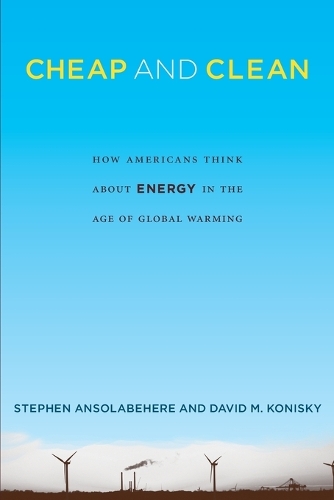
Cheap and Clean: How Americans Think about Energy in the Age of Global Warming
(Paperback)
Publishing Details
Cheap and Clean: How Americans Think about Energy in the Age of Global Warming
By (Author) Stephen Ansolabehere
By (author) David M. Konisky
MIT Press Ltd
MIT Press
7th October 2016
United States
Classifications
Tertiary Education
Non Fiction
Climate change
Alternative and renewable energy sources and technology
333.7940973
Winner of Winner, 2015 Don K. Price Award given by the Science, Technology and Environmental Politics section of the American Political Science Association. 2015
Physical Properties
Paperback
272
Width 152mm, Height 229mm, Spine 16mm
Description
How Americans make energy choices, why they think locally (not globally), and how this can shape U.S. energy and climate change policy.How do Americans think about energy Is the debate over fossil fuels highly partisan and ideological Does public opinion about fossil fuels and alternative energies divide along the fault between red states and blue states And how much do concerns about climate change weigh on their opinions In Cheap and Clean, Stephen Ansolabehere and David Konisky show that Americans are more pragmatic than ideological in their opinions about energy alternatives, more unified than divided about their main concerns, and more local than global in their approach to energy. Drawing on extensive surveys they designed and conducted over the course of a decade (in conjunction with MIT's Energy Initiative), Ansolabehere and Konisky report that beliefs about the costs and environmental harms associated with particular fuels drive public opinions about energy. People approach energy choices as consumers, and what is most important to them is simply that energy be cheap and clean. Most of us want energy at low economic cost and with little social cost (that is, minimal health risk from pollution). The authors also find that although environmental concerns weigh heavily in people's energy preferences, these concerns are local and not global. Worries about global warming are less pressing to most than worries about their own city's smog and toxic waste. With this in mind, Ansolabehere and Konisky argue for policies that target both local pollutants and carbon emissions (the main source of global warming). The local and immediate nature of people's energy concerns can be the starting point for a new approach to energy and climate change policy.
Author Bio
Stephen Ansolabehere is Professor of Government at Harvard University and coauthor of The End of Inequality and other books. David M. Konisky is Associate Professor in the School of Public and Environmental Affairs and the coeditor of Failed Promises- Evaluating the Federal Government's Response to Environmental Justice (MIT Press).
